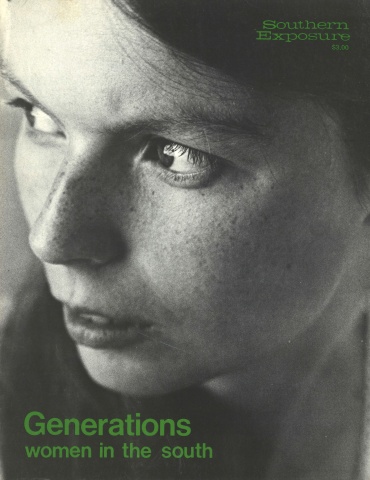
This article originally appeared in Southern Exposure Vol. 4 No. 4, "Generations: Women in the South." Find more from that issue here.
“Appalachian women have more faces than these few poems can mirror, but there are some wrinkles that always form around the eyes, some same angle in every smile, some common sound in the telling of every life ....
“Aunt Neva is the most traditional woman in my family. She has always lived in rural Eastern Kentucky, farming the same piece of land. Most importantly, she feels this life is the best of all possible lives to be had, and has been responsible for transferring to me much of what I see as positive about mountain culture.
“Often when I think of Appalachian women, the word ‘waiting’ comes to mind — waiting to leave a parent’s home, waiting for times to be easier, waiting for the children to be grown, waiting for the peace and luxury of growing old with a mate with whom a long struggle has been shared. ‘The Garden’ is my Aunt Flossie’s story of such waiting. She married Elijah when she was sixteen and moved a stone’s throw from her parents’ house. These two homes have a path between them worn by the daily crossings of three generations. Then Flossie lost her children to marriage and her parents and husband to death all very near the same time. After having been a hub in this wheel of family, she finds all the spokes gone and the rim of the world will not connect to her center.”
— Lee Howard
The Garden
1
She smoothes her wrinkleless skirt
(A-lined and middle-kneed)
Straightens her glasses
dabs at the corner of her eye
and resettles her hands
for the tenth time
in her lap
And says
Lige always had a pretty garden
His beans were the fullest in Clay County
His corn the sweetest
He always took such pleasure in it
especially in the evening in it
And silent
as she combs the new-turned spring ground
for a sign of a dead man
but not one seed of him
can be found
2
She had the trees pruned
til their new green
looks like second growth
on old stumps
They offer no shade
Lige and she
just last summer
sat listening to crickets
and the train-rumble rattle
of the auctioneer
selling chickens and couches
across the road
til long after the moon
rose above the dark hills
and the hollows were quiet
Coming from the path along the garden
I heard their soft murmur
like the humming of a stream
like voices in a dream
to the music of katy-dids
they sang
their children’s lives
And without words
stroked the rough skin
of their hands
as they watched
but did not see
the hugeness of the night
3
The house rings with only 2 footsteps
now
she watches snow fall
even and steady
as the beat of a heart
She cannot see beyond the yard
of the old homeplace
on the other side of the frozen garden
strange children play
around the thick-trunked trees
She once hung tin from them as saplings
to keep the birds away
Now old nests fall under the weight of the snow
to the delight of other childhoods
Her own lost
with the losing of the two that found her
Her own future lost
with losing of the one who took her
Stuck in the present
her empty womb aches
She closes the curtain
on the endless sea of white sameness
and cries for all that’s been too long gone
and cannot ever come back again.
Kentucky Girlhood
If you put your ear to the rail
Miles away trains will rumble their coming
with a clicktyclack clacktyclick
hurrah
Whistle will blow
far through deep green valleys
and ricochet off mountain sides
to stop at the door
of where you hear
inside the ear of your wanting
to see beyond the hills you’re cradled in
So you kneel by
parallel steel
ribbons
Squeezing in between the ties
And pray to the song of a smoke-belching machine
to come sweep you out of this smooth wide lap of a world
before you are rocked to sleep
You are very still
listening
for the hurrying sound of your dreams
And your heart goes
clicktyclack
and back again
As you yearn your soul to motion
Aunt Neva
Grey hair pinned to the nape of her neck
and green eyes like summer
singing an old song
with words half-remembered
and the tune tucked into the tip of her tongue
saying
Long-me-life and ’pon my honor
I never
No I never
but I’ve thought about it some
I’ve run me a day and a night
through these hills
and chewed mountain tea
that tastes just like that brought-on gum
And never
’pon my honor never
felt there was more
I should be wanting
than what I ever had
And I had me a good man
who worked with me
this land
and fine corn
head high
we did grow it
and into our stone mill
we did throw it
and all winter with lard we had rendered
I made pone after pone
of crackling bread
And never
’pon my honor
never
did I miss a french roll
I never had
And I had me all I wanted
for I’ve known me this holler
and everything that lives on it
and if I lacked for nothing
why should I worry for something
that could be elsewhere had
No I never
’pon my honor
I never
wished for nary thing
that could be elsewhere had
Tags
Lee Howard
Lee Howard grew up in the Kentucky mountains and now lives in Washington, D.C. (1977)
Lee Howard grew up in rural eastern Kentucky; she now lives in Washington, D.C. A collection of her poems will be featured in the forthcoming special issue of Southern Exposure on women in the South. (1976)

